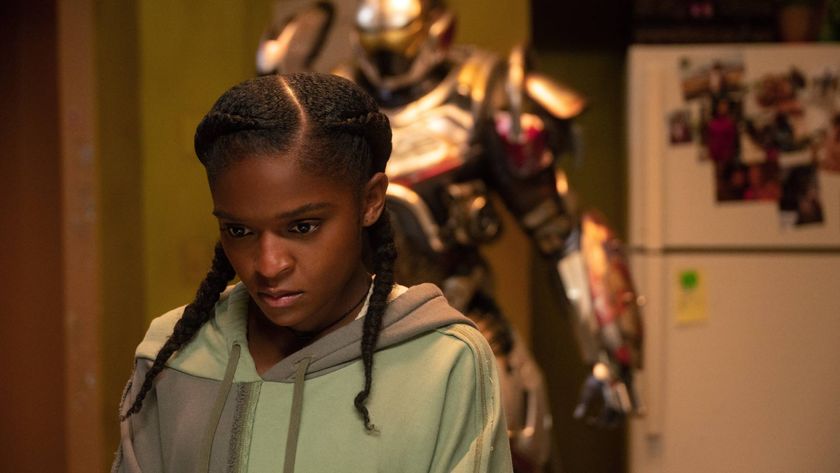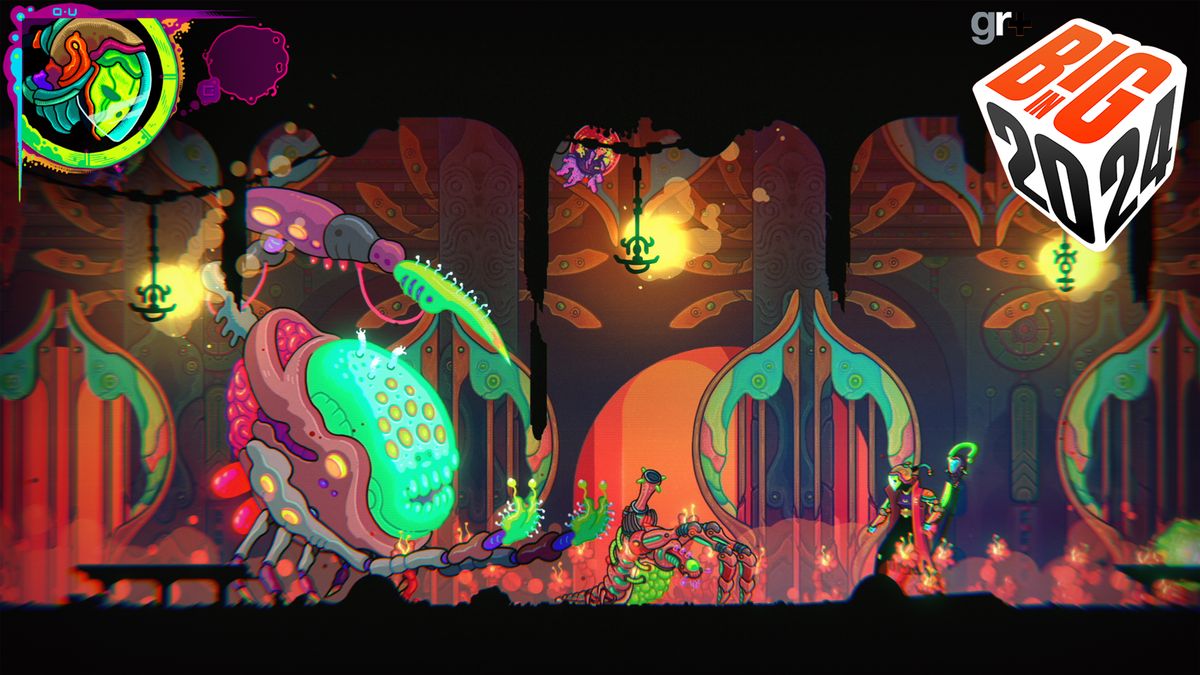
I cannot, will not stop talking about Ultros. This upcoming metroidvania enraptured my attention when I sampled its trippy wicked action at Gamescom 2023, where I found developer Hadoque's debut effort to be both startlingly confident in its ideas and staggeringly deliberate with its execution. So much so that anytime anybody asks me about the video games I have on my radar for 2024, I'd immediately kick off on a tirade about needing to return to The Sarcophagus – the cosmic uterus which Ultros' strange time loops unfurl throughout. A rule was put in place on the group thread that there would be no more Ultros talk until they could all also play it – fair is fair, right? Wrong. As Ultros puts it every time you succumb to one of the haunting mysteries of its world: The Cycle Begins Anew.
12DOVE is exploring the most anticipated video games of the year with Big in 2024, with new articles dropping every day throughout January.
That's because I recently had a chance to play a couple of hours of Ultros ahead of its release on February 13 for PC, PS5, and PS4, and I'm more convinced than ever before that it could be something really special – much to the chagrin of my long-suffering friends. So, what is it about Ultros and its psychedelic science-fiction design that has burrowed so deeply into the depths of my mind? The maddeningly creative visual aesthetic for sure, but there's more to it than that. The blend of weighted action and tightly-timed platforming, the esoteric narrative concepts carefully woven throughout the wider tapestry, and the option to take a break from the headtrip to indulge in a little gardening.
Into the unknown
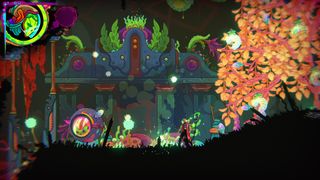
Earning a green thumb isn't necessarily something I've come to expect from this genre, but it works perfectly within the world of Ultros. As protagonist Ouji begins to push further through the Sarcophagus, carefully dissecting enemy creatures in combat, harvesting their organs for health and improved ability spreads, it quickly becomes clear that progression isn't always measured through traditional cycles of exploration. Think of the best Metroidvania games, from Metroid Fusion to Hollow Knight, where an increasing powerset traditionally unlocks new avenues of exploration, but in Ultros it's the various seeds you plunge into the soil, and cultivate across loops, that allow you to move deeper into the world – a vine may eventually grow large enough to poke through once-obscured sections of the map, for example, or wither if left unattended for too long.
It's a smart inversion of the traditional metroidvania structure, and undoubtedly one of the coolest aspects of the studio's introspective approach to design. "We wanted to steer away from the common individualistic point of view in games, especially action games, where the hero usually works towards becoming almighty by "dominating" the world around them," says Mårten Brüggeman, game design director and project manager. "We wanted to give the player the option to, instead, be able to tend to the world – treating it, letting it evolve – and the world will sort of let you in."
"A common perception of a game world is that it's a kind of playground for the player to play around in – it's there for the player's enjoyment. Of course, that's how it should be in most cases. We play games to get entertained," Brüggeman continues, "but delving into the themes we wanted to explore with Ultros, and what we wanted our game world to symbolize, we felt we wanted to challenge that meta a bit." Ultros plays smartly with expectation then – "what the actions and structure of a game communicates to the player" – even if you aren't always overtly aware that this meta element is even at play. "The game still allows you to invest in your player's skills and progression if that's what you want. There are, however, opportunities to start thinking about your actions and decisions within the game. By choosing to do things differently, maybe this can translate into something deeper for some players."
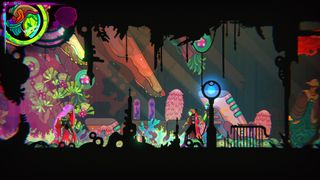
In fact, creative director and art director Niklas 'El Huervo' Åkerblad says that Ultros will have plenty to say on the nature of life and death, growth and rebirth, should you want to go looking for it. "There are quite a few things I hope to evoke. But these are mainly complex emotions of existential nature, and really something I hope the players will experience within themselves and make their own interpretations from. The themes for these musings evolve around shortsightedness, something I feel we humans are inexplicably prone to when facing grand, existential questions like the environment, conflicts, and concerning society as a whole," he says.
"Another major theme is how to find constructive solutions to conflicts where we tend to use violence. Strength and hardness are death's companions, whereas openness and vulnerability are essential for growth… Life, in general, is a lot about breaking cycles of habits in order to change and evolve. I would say that in the face of the philosophical implications explored in Ultros, this is a metaphor the player can explore through the game."
Sign up to the 12DOVE Newsletter
Weekly digests, tales from the communities you love, and more
The Cycle Begins Anew
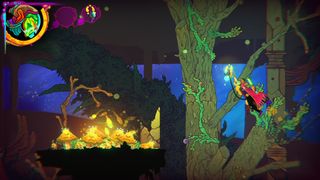
Ouji has her own part to play in the Sarcophagus. Whether it's to prevent the birth of a demonic being, or to inadvertently allow its release as you work to escape the loop of a black hole, remains unclear from my time with Ultros. Even if you aren't quite ready on your personal journey through the cosmos for a little existential introspection, there is still plenty to wrap your head around. The organs you harvest from creatures, appearing in your inventory in various states of disrepair depending on how cleanly you execute a kill, translate into a variety of resources – each used to fuel progression across a branching skill tree, improving everything from the scope of your combos to your proficiency in world navigation.
Interestingly, this tree resets between loops. There are numerous opportunities for the cycle to begin anew at key points of the story, although the only surefire way I've found to reset the loop has been through killing one of seven entombed Shamans – typically guarded by a truly monstrous, challenging boss encounter. As for why, that's a closely-guarded secret for the time being. "To fully answer that, I would have to spoil quite a bit of the lore," says Åkerblad. "But it's safe to say that there seems to be an impending catastrophe brewing onboard the Sarcophagus, and someone has clearly constructed a sort of fail-safe that kicks in when it hits the fan, thus giving everyone a chance to start anew."
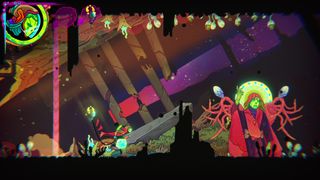
That isn't to say that everything changes between cycles. Rare items hidden throughout the world will let you 'lock a memory in place' which effectively lets you retain a skill on the tree for the next cycle, which in itself changes the direction in which you're able to approach unlocks the next time around. "Talking about semantics like loops and cycles in a game context will nowadays invite the idea of a game being a roguelike. While we don't consider Ultros a roguelike, we still had to take this notion into consideration," says Brüggeman. "So, I see it more as if the game flirts and plays with roguelike mechanics without them being the core of the experience. Ultros instead focuses on the exciting parts of retreading familiar ground, but with new knowledge and priming of situations in previous cycles."
Brüggeman continues: "The loop mechanism comes more out of philosophical ideas than mechanical. Spiritually, we've thought about the cycle as karmic, where the actions you make in one loop may affect what comes in the next one. Tending to gardening is also about cycles, or seasons. What you plant at one point can either grow larger or die during the course of a season. These two aspects tie together how we see the cycle. Much like plants, while some things stay the same, other things may have evolved as a cycle begins anew. So, the cycle in the game functions as a tie-in to the story themes, and as a tool for the player to work with to evolve the game world over time."

Josh West is the Editor-in-Chief of 12DOVE. He has over 15 years experience in online and print journalism, and holds a BA (Hons) in Journalism and Feature Writing. Prior to starting his current position, Josh has served as GR+'s Features Editor and Deputy Editor of games™ magazine, and has freelanced for numerous publications including 3D Artist, Edge magazine, iCreate, Metal Hammer, Play, Retro Gamer, and SFX. Additionally, he has appeared on the BBC and ITV to provide expert comment, written for Scholastic books, edited a book for Hachette, and worked as the Assistant Producer of the Future Games Show. In his spare time, Josh likes to play bass guitar and video games. Years ago, he was in a few movies and TV shows that you've definitely seen but will never be able to spot him in.

"30 years of history reside in our tape backups": PlayStation's building a game preservation mineshaft vault with 200 million files going back to a 1994 build of PS1 JRPG Arc the Lad

The other big Soulslike out this week has some Bloodborne and Dark Souls 3 in its combat, dev says, but "we would rather call AI Limit an action RPG"










